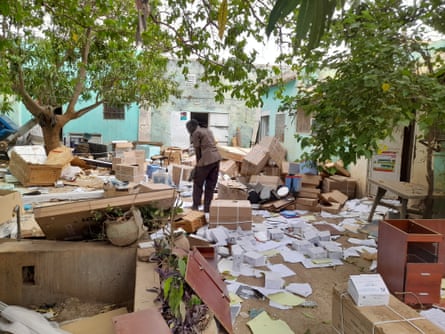Attacks on health workers, hospitals and clinics in conflict zones jumped 25% last year to their highest level on record, a new report has found.
While the increase was largely driven by new wars in Gaza and Sudan, continuing conflicts such as Ukraine and Myanmar also saw such attacks continue “at a relentless pace”, the Safeguarding Health in Conflict coalition said.
Researchers recorded more than 2,500 incidents of “violence against or obstruction of healthcare” in 2023, including the killing or kidnapping of health workers and the bombing, looting and occupation of hospitals.
The coalition called for national and international prosecutions of “war crimes and crimes against humanity involving attacks on the wounded and sick, health facilities and health workers”.
Its report highlighted cases of attacks on children’s hospitals and sites running immunisation campaigns, leaving people vulnerable to infectious diseases. It also warned of a new trend in which drones armed with explosive weapons are used to target health facilities.
Leonard Rubenstein, of the Johns Hopkins school of public health, who chairs the coalition, said violence inflicted on healthcare workers and facilities had “reached appalling levels”. The report included examples where workers had been deliberately targeted, and others where combatants were reckless or indifferent to the harm caused, he said.
“The lack of restraint we are seeing, from the beginning of conflicts, suggests to me that the law on protecting healthcare has had no meaning to combatants,” Rubenstein said.
“The one consistent feature of the attacks was continued impunity for these crimes. For more than a decade, despite their repeated commitments, governments have failed to follow through on these commitments and reform their military practices, cease arms transfers to perpetrators, and bring those responsible for crimes to justice.”

The coalition is made up of more than 40 nongovernmental organisations and has produced annual reports for the past 11 years. It identified 2,562 incidents of violence against or obstruction of health care in conflicts in 2023.
These included 685 cases where health workers – including doctors, nurses, and ambulance drivers – were arrested or kidnapped, and 487 instances where they had been killed, almost double the number in 2022.
In other cases, health facilities were damaged or destroyed by both government forces and non-state armed groups. Those facilities were also “increasingly occupied or repurposed for military use”, in violation of humanitarian law, the report found.
The figures should be considered underestimates, because it is difficult to get information from conflict zones, the researchers said.
They identified 11 countries and territories where children’s health services were affected, including the bombing or occupation of al-Nasr Children’s Hospital in Gaza City, Juwana Amal Center for Children with Cancer in Khartoum and Kherson Regional Children’s Clinical Hospital in Ukraine.
Longstanding conflicts have “cumulative and lasting effects”, the report warned, leaving little or no functioning health system even after the violence ends.
Rubenstein said: “The impact on access to healthcare, to the population, is enormous in the aftermath of these attacks – and continues even as conflicts decline, which we see in Tigray, Ethiopia, in Yemen – because of the destruction, or the severe damage to the health system, and the departure of so many health workers.”
He said statements by Dr Tedros Adhanom Ghebreyesus, the director general of the World Health Organization, and other officials condemning violence towards healthcare could be “a basis for more concerted global leadership”.
Rubenstein said that must include prosecutions to provide justice and act as a deterrent. Monday’s announcement by the chief prosecutor of the international criminal court that he was seeking arrest warrants for Hamas and Israeli officials for war crimes was “welcome”, he said.
“We need accountability for many crimes in that war, but it’s important too for crimes specifically involving provision of healthcare or misuse of health facilities to be charged,” Rubenstein said. “And I think we still have not seen that.”
Source: theguardian.com


